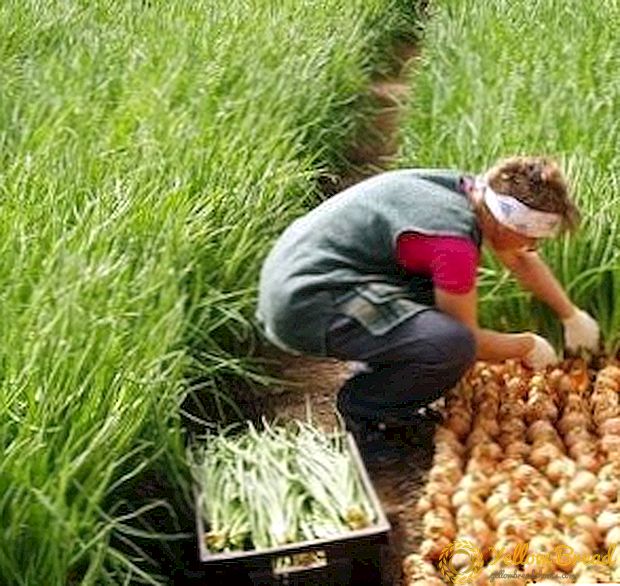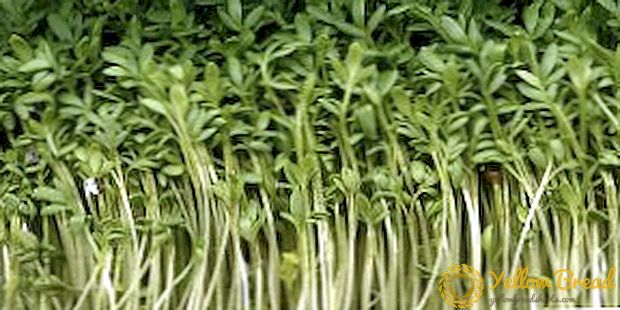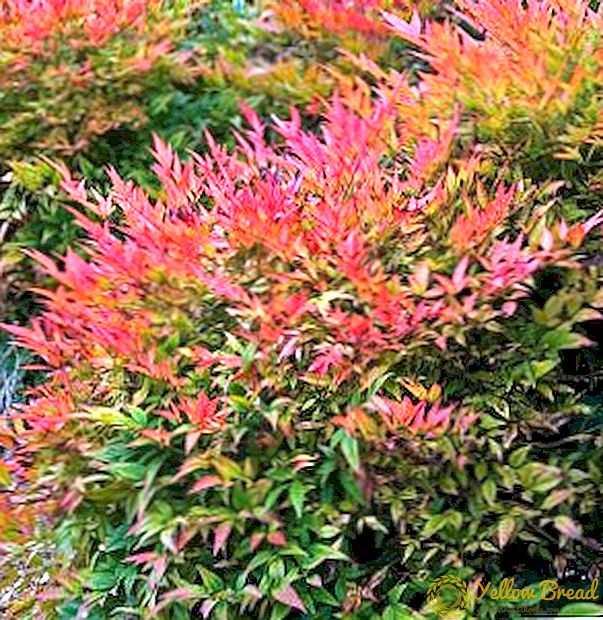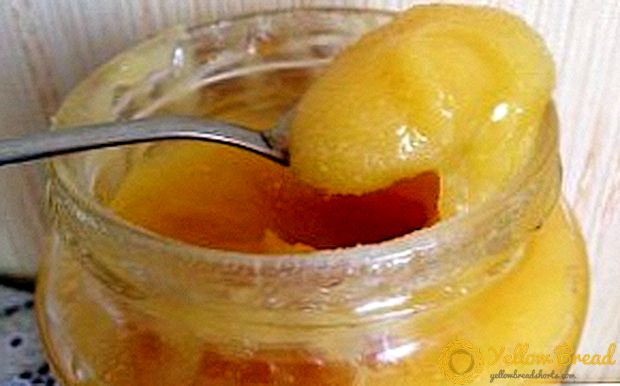
Tomatoes - perhaps the most favorite vegetable on our table. That is why they do not grow them in the country unless they are lazy. It is for those gardeners who would like to have their own tomatoes, but who absolutely do not want to spend their energy on caring for capricious plants, intelligent breeders brought out an amazing hybrid. This variety is called - Lazy man.
- Description
- Bushes
- Fruit
- Characteristic variety
- Advantages and disadvantages
- Growing seedlings
- Soil and Seed Preparation
- Sowing scheme
- Seedling care and picking
- Peculiarities of permanent care
- Watering
- Top dressing
- Garter and pasynkovanie
- Diseases and pests
- Harvesting
Description
This variety of tomatoes owes its appearance to the efforts of Siberian breeders. The hybrid was launched quite recently, which did not prevent him from gaining deserved popularity for some 5-6 years both among professional farmers and among ordinary amateur gardeners. Formally, by the way, the variety is amateur, since until today, these tomatoes have not been officially registered. Lazyka seeds can be purchased under the brand of agrotechnical firm "Siberian Garden"located in Novosibirsk, but selling its products through an online store.

Bushes
Bushes at this hybrid low and compact. Justifying the name, the variety is great for inexperienced or lazy summer residents, because, in principle, it can do without formation. The maximum height is 0.6 m. Ideally, it is recommended to remove the stepchildren appearing below the first brush, as well as removing the top of the bush at about 0.4-0.5 m (height), but the tomatoes will bear good fruit even without such minimal processing.
Tomato bush "Lazy" refers to the determinant mind That is why it does not require special work in terms of formation. Standard bush, that is, it has a dense, straight stalk that does not grow not only upwards but also along the sides.From four to six inflorescences on each bush - that's all you can expect from this hybrid, so it is perfect for small summer cottages and limited in size greenhouses. At the same time, fruit brushes are mainly formed on the lateral branches, which is why it is recommended to remove the top. Despite the fact that the standard of the standard tomatoes is compact and there is no need for additional tying, the Lazybird is still recommended not to leave without a garter, otherwise under the weight of the bountiful harvest of large fruits of the branch just fall on the ground. From contact with the ground, the fruits become infected with various diseases and become unsuitable for consumption.

Fruit
With a small bush, the tomato forms quite large fruits, which, by the way, is in itself a rarity. The average weight of each is about 300 grams, and if you create good conditions for a tomato, this is 500 grams. According to the generally accepted gradation, such tomatoes can be safely classified as giants.
Lazy fruit has a slightly elongated shape and a bright red or crimson color. These tomatoes are quite dense and smooth, which provides them with good transportability. The flesh looks very appetizing, has a dense structure and at the same time is very juicy and tender. There are almost no seed chambers. Tomatoes of this variety are great for salads, they have a very harmonious sweetish taste and almost no sourness.

Because of the large size, these tomatoes are not very suitable for preservation. But juices, pastes and other homemade preparations, including tomato puree or tomatoes, cut into slices (adjika, lecho) as an ingredient, are excellent from these fruits. And such tomatoes can be dried, cut into small pieces and remove the seeds and juice. Dried tomatoes are a real delicacy and excellent additive in pasta, sauces and meat dishes.
Characteristic variety
According to the ripening period Lazyka refers to early ripe tomatoes, here it is not original: almost all low-growing tomatoes ripen early. Three months, plus or minus a few days - a period that usually elapses from the moment when the cropped seed appeared above the ground, until technical maturity is achieved with the first tomato. However, the crop of Lazyas ripens quite amicably.

This hybrid is intended for cultivation in the open field or in greenhouses (and the huge covered areas of these stunted compact varieties are not required at all, rather low film cover).
Tomato Lazyayka has a rather high yield: creating good conditions for the plant, up to 6 kg of fruits per season can be removed from one bush, but the variety still produces about 3 kg of crop with less efficiency.

The causative agents of two serious fungal diseases of tomatoes - phytophtoras and macrosporosis - are almost not dangerous to this variety due to the resistance to these fungi specially developed as a result of selective work.
Advantages and disadvantages
The advantages of the Siberian hybrid are undoubted and obvious. Summing up the above characteristics, it is possible to identify the following reasons why this variety should definitely be planted on the site:
- no need to engage in the formation of the bush;
- the possibility of growing in small areas;
- high productivity;
- very large fruits with a small growth of the bush;
- good external and taste qualities of tomatoes;
- possibility of long-term storage and low losses during transportation;
- early ripening of the crop;
- the ability of fruits to ripen separately from the bush;
- the suitability of the crop for fresh consumption and as a raw material for harvesting;
- resistance to cold and temperature changes in spring and autumn;
- good immunity against fungal diseases, as well as other diseases and pests;
- friendly fruit formation.
Despite the abundance of enthusiastic reviews, those who planted a tomato Lazy, note some disadvantages of the hybrid. First of all, they are connected with the fact that high yields are achievable only on very fertile soil. In addition, like true Siberians, these tomatoes easily tolerate frost, but are very susceptible to overheating and drought, so you should not count on a good harvest without regular watering, especially in hot climates.Finally, if usually standard low-growing tomatoes can not be tied up, Lazyka cannot do without a garter - the side branches are not able to withstand a brush of several half-kilogram fruits.
Growing seedlings
So, Lazyka requires minimal care with maximum efficiency, but this does not mean that these tomatoes can grow like weeds. In order for the crop to conform to the characteristics stated in the description of the variety, certain rules and requirements to observe are still necessary. We start, as always, with

Soil and Seed Preparation
The first question that arises when growing seedlings is when to start. The right timing is the key to success, because too late planted seedlings will not allow you to grow an early crop, and as we remember, this is a medium-early variety, but if you plant the seeds early, there can be no less problems. An overgrown, too large seedling, very hard to take root, and, therefore, there is a risk of losing the plant after transplantation.

On the recommendation of the manufacturer sowing seeds for seedlings should be carried out in mid-MarchHowever, this term is very conditional.It all depends on when the real spring comes to your region. If in the south of Ukraine tomatoes can be planted safely in open ground in April, then frosts beyond the Urals at the end of May are not uncommon.
A lazy dog is a hybrid, which means that only seeds purchased at a specialty store will be suitable for breeding it (seeds from last year’s crop are not suitable for planting material). In principle, the manufacturer necessarily conducts the necessary seed treatment, which should make life easier for the summer resident. And yet, for better results, the material must be prepared before planting.

First, get rid of the "marriage". Pour the seeds on a saucer and carefully consider. We immediately select a clear "trifle", as well as seeds, whose integrity is violated. Externally, high-quality seeds poured into a container of water and leave for a few minutes. Everything that after a while continues to float on the surface is also ruthlessly removed - such seeds will not germinate anyway,and only in vain will occupy a place in the container, and in fact we want to know as precisely as possible how many tomato bushes we will have in the end.
Selected as a result of such manipulations, we keep the seeds for a quarter of an hour in a weak solution of potassium permanganate or hydrogen peroxide (this procedure is popularly called dressing), after which we wash and wipe another half day in the growth stimulator (it can be purchased at any specialized store). It is also good to add complex mineral fertilizer to the soaking solution.
As already mentioned, Lazyka well grows far from any soil. Soil oversaturated with fertilizers is poorly suited. Also, these tomatoes do not like acidic soil. Therefore, both for planting the seedlings, and on the garden in the future, it is necessary to provide a neutral in acidity land with good aeration.

Sowing scheme
If the seedlings are planted in special cassettes, you can lay one seed in each nest. If common boxes are used, grooves of about 1.5 cm in depth are made in the previously prepared loose soil, then with a knife tip, toothpick or other narrow long object, gently picking up each seed, they are placed on the bottom of the groove 2-3 cm apart from each other, after what the earth neatly powdered.
It is advisable not to water the seedlings before the first shootstherefore, the ground must be well moistened before embedding the seeds. After that, you just need to gently spray the surface of the soil so that it does not dry out. To preserve moisture, you can also tighten the surface of the box film.

Seedling care and picking
For quick germination seeds need warmth. During this period, the ambient temperature should range from 20 ° C to 26 ° C. When almost all the seeds have sprung up, the containers can be moved to a cooler place and grown at a daytime temperature of around 15 ° C and at night a couple of degrees lower.
After the sprout forms two true leaves, they pick it up: the seedlings are transplanted or transferred to a larger pot (ideally, peaty, it can later be planted directly in open ground without disturbing the bush once more).

The earlier a dive is made, the easier it is carried by the plant! If the seeds were prepared correctly and planted at a sufficient distance from each other, a pick can be made without damaging the still very weak root system of tomatoes.
If the plants are planted too tightly, a pick should be preferred to stronger shoots. Any signs of illness, weakness and root rot are grounds for culling: it is better to abandon the doomed plant right away than to carry the peddler of diseases to the garden.

An important step in the care of seedlings is hardening. The procedure must begin 7-10 days before the intended landing in open ground. The containers with seedlings are taken out into the open air, first for a few hours during the day, then the time spent on the street gradually increases,in the end, the seedlings must learn to spend this way all night (assuming, of course, that the temperature of the air outside at night does not fall below 10 ° C heat, the lower bushes, despite Siberian health, will not survive).
When the weather finally settles, we plant seedlings at a permanent place.

Landing scheme - six bushes per square meter.
Peculiarities of permanent care
As already mentioned, Lazy can be grown both in open ground and in the greenhouse. The first option is suitable for the middle band, the second - for colder regions. The variety has proven itself in such Russian regions as Vologda, Astrakhan and Voronezh, as well as in the Krasnodar Territory and even in the Caucasus. Under the film, such tomatoes are successfully grown in the Urals. Of course, the agrotechnology of growing tomatoes in the beds and in the greenhouse is somewhat different.
Watering
Drying the soil - perhaps the only thing that Lazy does not tolerate. In addition, all the nutrients from the soil (and to their quantity, as we said, this variety is very demanding) can be properly assimilated exclusively dissolved in water.Therefore, poor watering automatically means insufficient nutrition, a break in development, and, consequently, a shortage of harvest.

For greenhouse cultivation, tomatoes are watered weekly, but in the open field requires more frequent watering. However, an overabundance of moisture should also be avoided, since in this case the plants are at serious risk of fungal infections (for all the resistance of the Lazykes to their main pathogens, it’s not worth risking), in addition, the taste qualities of the fruits also suffer.
Plants of the Solanaceae family should not be watered. They tolerate water on the leaves very badly. Water should be poured only under the root, and it is desirable that it be warm.

Weeding beds from weeds, as well as loosening the soil after each watering, can be avoided, but this, as Zhvanetsky said, “if you are not interested in the result”. In fact, Lazyka will give you a good harvest and without these additional tweaks, but for an additional fence reward more impressive amount of fruit.
Top dressing
To ensure high yields of the variety, it is necessary to create a good nutrition for the plant. During the entire growing season it is necessary to carry out at least three supplements, alternating mineral fertilizers with organic ones. In this case, the bush will be able to lay a fruit brush earlier and provide the harvest with the fastest ripening.

Garter and pasynkovanie
As mentioned above, fruit clusters Lazyka forms on the side shoots. All stepchildren who are below the first brush should be carefully removed (do not tear off, but cut, otherwise there is a risk of damage to the bush).

Each bunch of a hybrid is from two to four giant tomatoes with a minimum of 300 g each. It is clear that under a polutorakilogrammovym weight will break or even bend even enough strong branch, so without garter the bush for a full crop can not count.

The design and rigidity of the trellis for the garter is better thought out in advance so that each of the numerous side branches has its own support. At the same time, when planning the design, it is necessary to take into account the low growth of tomatoes, so that it does not work out that the bush simply cannot reach the prepared horizontal support.
Diseases and pests
Above, we mentioned that to the two main enemies of tomatoes from the genus of fungal diseases, the Lazyka variety has stable immunity. However, this does not mean that the fungal infections are not terrible to the plant at all.
The best way to prevent fungal diseases and decay is to regularly ventilate greenhouses and maintain an optimal microclimate in them according to three main criteria: light, temperature, humidity. Low temperature and high humidity are ideal conditions for the reproduction of mushrooms.

Also, in order to avoid infection, it is recommended that tomatoes be sprayed starting from the rassadny state with an Ordan-type fungicide.
But to whom Lazyka is practically defenseless, this is a universal aphid, as well as thrips, bear and slugs. The first two pests can be destroyed by treating the Bison-type insecticide bedding plant; aphid can also be washed off in the early stages by abundantly spraying the shrub with soapy water (the inner part of the leaf should be carefully treated). Two other pests can be removed by carefully loosening the soil, as well as treating it with an “explosive” mixture of mustard powder and chili peppers (1 tablespoon per bucket of water).
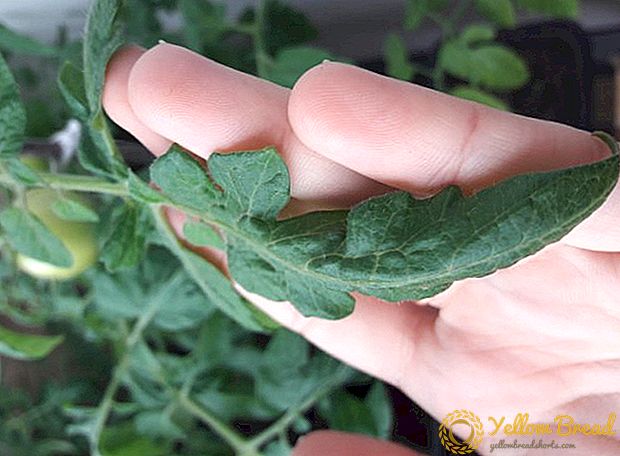
In addition, the favorable environment for slugs, as well as for fungi, is overmoistened soil.
Harvesting
As already mentioned, tomatoes of this variety begin to ripen on average three months after the emergence of shoots. To speed up the process, farmers plant seedlings in greenhouses at the age of one and a half months.

Large, tasty and strong fruits - a real feast for the gardener. They can be stored and transported for a long time., and also to use in any of all possible ways (except, perhaps, canning entirely, and that only because such a giant will not pass through the mouth of a can).Even if you, while justifying the name, will not give your garden enough attention during the season, you can still count on a dozen three hundred gram monsters from the bush. And, not being too lazy and providing the plant with proper care, this indicator can be increased at least twice!
So, after planting a Lazyka variety tomato on your site, you have every chance to be satisfied with the result. This hybrid is equally suitable for industrial production, because it is unpretentious, productive and can be stored for a long time, and for ordinary summer residents, because it does not require in-depth knowledge of agricultural technology and can be successfully cultivated even by a newcomer in agriculture! Nevertheless, it is best to choose this hybrid for residents of the northern regions, since the cold tolerates this tomato much easier than the heat.

